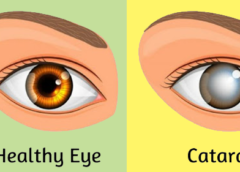A cataract occurs when the lens of your eye is foggy, as it is usually clear. For your eye to see, light passes through a clear lens. The lens is (colored part of your eye) behind your iris. The lens focuses the light so that the brain and eye can work together to capture details.
When a cataract clouds over the lens, your eye can’t focus light in the same way. In this blog we will know abut the Cataracta and its Symptoms, Causes and Prevention Tips.
What Are the Symptoms?
Cataracts usually form slowly. You may not know you have them until they start to block light. Then you might notice:
- Vision that’s cloudy, blurry, foggy, or filmy
- Nearsightedness (in older people)
- Changes in the way you see color
- Problems driving at night (glare from oncoming headlights, for example)
- Problems with glare during the day
- Double vision in the affected eye
- Trouble with eyeglasses or contact lenses not working well
Causes
Medically, the reason for cataract forming is not clear, but researchers have identified a few possible causes, which are:
- Age: Lens degrades with age, and the process is accelerated due to diseases and infection.
- Wound or fatal incident that left the damaged or wounded eye.
- Radiation: Exposure to UV radiations from sunlight, or X-rays etc. Microwave radiation has also been found to damage skin.
- Diseases like diabetes, hypertension, obesity, etc. which affect different body organs.
- Smoking and alcohol consumption.
- Prolonged use of corticosteroid medications.
- Statin medicines used to reduce cholesterol.
- An eye injury or inflammation.
- Infection after a surgery.
- Hormone replacement therapy.
- High myopia.
- Family history or genetic disorder.
- Deficiency of Vitamin C.
Risk factors
Cataracts may also occur at birth (congenital cataracts) due to a faulty gene and may develop in children (childhood cataracts) associated with pregnancy infection or trauma. Cataracts are uncommon in neonates and babies.
Other factors which could increase the risk of cataract development include:
- A family history of cataracts
- Diabetes
- High blood pressure
- Other eye conditions such as uveitis
- Previous eye surgery, injury or inflammation
- Long-term use of corticosteroid medication (eg: prednisone, prednisolone)
- Excessive exposure to sunlight
- Smoking
- Drinking too much alcohol
- Poor diet
- Obesity
What are complications of cataracts?
Occasionally, a long-lasting, very dense cataract can expand in size and interfere with fluid drainage inside the eye. Additionally, a far advanced cataract can leak protein into the eye, causing the eye to become inflamed.Your doctor will advise you of these possibilities and may recommend surgery to avoid these complications even if the decrease in vision is not bothering you.
The presence of a cataract can make it more difficult to diagnose retina diseases because the doctor has to look through the cataract to examine the retina.
Prevention Tips
No studies have shown how cataracts can be avoided or cataract growth delayed. But doctors believe multiple approaches may be useful, including:
- Quit smoking: Ask your doctor for suggestions about how to stop smoking. Medications, counseling and other strategies are available to help you.
- Manage other health problems: If you have diabetes or other medical conditions that may raise the risk of cataracts, follow the treatment plan.
- Take a healthy diet includes good amount of fruits and vegetables. Adding a number of colorful fruits and vegetables to your diet will ensure you get plenty of vitamins and nutrients. Fruits and vegetables have many antioxidants, which help maintain the health of your eyes.
- A large population study recently found that a balanced, vitamin- and mineral-rich diet was associated with a reduced risk of cataract development. Fruits and vegetables have many proven health benefits and are a safe way to increase the amount of minerals and vitamins in your diet.
- Limit alcohol use: Excessive use of alcohol will make cataracts more likely.
- Wear sunglasses: Ultraviolet light from the sun can help cataracts grow. When you are outside, wear sunglasses that block ultraviolet B (UVB) rays.
- Do regular eye test: Eye tests can help to diagnose cataracts and other eye conditions in their earliest stages. Ask your doctor how much you have to get an eye test.

Leave a Reply
You must be logged in to post a comment.